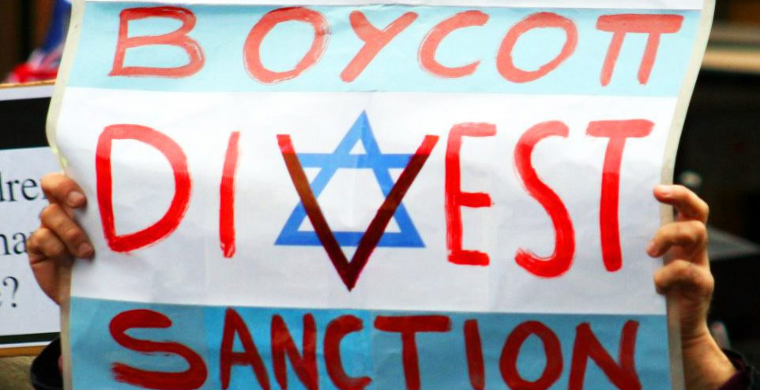Episcopal Church Leadership call for divestment in Israel: Is this ill-Disguised Anti-Semitism in the name of Human Rights?
News Analysis
By David W. Virtue, DD
www.virtueonline.org
October 24, 2019
The Episcopal Church's Executive Council at the recommendation of Council's Committee on Corporate Social Responsibility, (CCSR) wants the church to disinvest three companies from the Church's investment portfolio and placement and put on a No Buy List.
They include Caterpillar, Motorola Solutions and the Israel Discount Bank. Further, Council asks CCSR "to pursue continued engagement with Facebook, Booking.com, and TripAdvisor, urging them to address human rights violations through complicity in the occupation of the OPT, and seeking to assure that the companies take all necessary steps to end their complicity in the occupation."
Now this is not the first time Episcopal Church deep thinkers have called for the Church to disinvest from Israel. In July of 2018, The Episcopal House of Bishops shot down Boycott, Divestment and Sanctions (BDS) over Judea and Samaria. However, the House of Bishops, by a large majority, voted down a measure overwhelmingly favored by the House of Deputies that would have sought to end what they believe is the church's financial complicity in the Israeli occupation of Palestinian territories, putting to rest for at least another three years one of the church's most divisive issues.
Resolution D019 would have asked Executive Council, based on 70 years of church policy toward the Middle East conflict, to research and develop a plan by 2019 for a "human rights investment screen," which critics described as a dangerous divestment from Israel.
However, there was pushback; "Divestment will not move us one inch forward in the peace process. It will not bring an end to the occupation. It will not lead us to the solution that we all yearn for, which is two states living side by side in peace within secure borders," said retired Bishop Ed Little of the Diocese of Northern Indiana. He was one of six bishops to speak against the resolution before the vote.
Now it has reappeared in an effort, no doubt, to get around the failed resolution at the last General Convention.
The ongoing slap at Israel by the Episcopal Church always fails to mention the continued harassment by Gaza dwellers who regularly fire rockets into Israel, burning up crops, destroying homes and killing its citizens. Since 2001, Palestinian militants have launched thousands of rocket and mortar attacks on Israel from the Gaza Strip as part of the continuing Arab--Israeli conflict. From 2004 to 2014, these attacks have killed 27 Israeli civilians, 5 foreign nationals, 5 IDF soldiers, and at least 11 Palestinians and injured more than 1900 people, but their main effect is their creation of widespread psychological trauma and disruption of daily life among the Israeli populace.
Episcopal Church leaders fail to mention any of this, seeing the ongoing situation in Israel primarily as an intransigent Jewish state unwilling to fully negotiate a two-state solution that would give the Palestinians their own state.
To this day, the West Bank Palestinian leadership has never recognized Israel as a legitimate state recognized by the Balfour Declaration and the UN, and Israel's continuing building of settlements on the West Bank angers Palestinians.
The wall to prevent militant attacks on Israel has been described as an "apartheid" wall, the reference being to South African apartheid which collapsed under international pressure. But there are differences. South Africa was never surrounded by six hostile nations out to destroy it. Blacks outnumbered whites four to one in South Africa. There are 8.7 million Israelis, there are only 1.8 million Palestinians living in Israel proper.
Many believe that if the Palestinians had the necessary weapons, they would not hesitate to push the Israelis into the Mediterranean Sea.
Many believe that the Boycott, Divestment, and Sanctions (BDS) campaign against Israel is little more than a public relations effort to demonize the Jewish state.
Israel, not surprisingly, sees the international boycott campaign as an existential threat to the Jewish state. Ironically, the UN council has identified 206 companies operating in Israeli settlements in the West Bank.
The Episcopal Church along with other mainline Protestant denominations believe that with pressure they can change the dynamic in Israel and bring her to heel.
It will never happen. Israel has the memory of the Holocaust and they will never relinquish what the believe they have won through blood sweat and tears.
It is delusional to think that addressing longstanding human rights violations can be achieved holding an economic gun to Israel's head. Israel will never bow to such threats and divestment will have little or any effect on their stock or Israel's ongoing security.
President Donald Trump has raised the ante by moving the US embassy to Jerusalem and the vast majority of Evangelicals support both his decision and the right of Israel to defend itself. They have little love of Palestinians who pose a threat to Israel.
One is forced to ask, is the call for divestment little more than ill-disguised anti-Semitism in the name of human rights by Episcopal Church leaders?
The Episcopal Church has shown itself to be on the wrong side of history on a plethora of issues from sexuality to divestment, and their numbers already declining will only continue to diminish.
END














